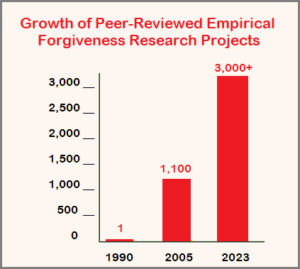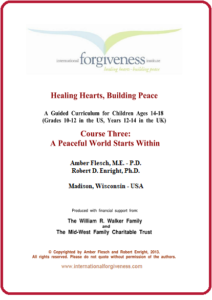Tagged: “Enright Forgiveness Process Model”
Although I value and try to forgive and mean well to those who harm me, I feel like that alone does not fix my wrecked inner world (lost trust, cynicism, depression). I can try my best to mean well, but that does not mean anyone else will. Does this mean I need more than forgiveness to heal?
What does love have to do with it? Do you really think that to forgive, we have to love the one who was brutal to us?
Does Forgiveness Work? Let’s Ask the Experts. . .
The benefits of forgiveness have been discussed and debated for centuries but scientific evidence that forgiveness actually “works” has been scant. All that has changed during the past few decades as legions of psychologists and clinicians have begun studying the ancient virtue from a stringently documented, peer-reviewed empirical perspective.
 Dr. Robert Enright, an educational psychologist labeled the “forgiveness trailblazer” by Time magazine (and co-founder of the International Forgiveness Institute), published the first scientific study on person-to-person forgiveness in 1989. In the 15 years following the publication of that article in the Journal of Adolescence, the number of published forgiveness articles had jumped to more than 1,100. And today, researchers can pore through more than 3,000 published articles brandishing empirical evidence on the virtue of forgiveness.
Dr. Robert Enright, an educational psychologist labeled the “forgiveness trailblazer” by Time magazine (and co-founder of the International Forgiveness Institute), published the first scientific study on person-to-person forgiveness in 1989. In the 15 years following the publication of that article in the Journal of Adolescence, the number of published forgiveness articles had jumped to more than 1,100. And today, researchers can pore through more than 3,000 published articles brandishing empirical evidence on the virtue of forgiveness.
Here is a quick look at several recent research reports related to the benefits of forgiveness:
Forgiveness Reduces Suicidal Behavior
Suicide is the second leading cause of death for young adults and about 1,100 college students die by suicide each year (Centers for Disease Control and Prevention). According to a study of 158 college students, all suffering from mild to severe depression, psychologists at East Tennessee State University found that:
“Students who are more capable of forgiving themselves and others after stressful life events or interpersonal problems have lower rates of suicidal behavior than their peers who are less able to forgive. This study points out that interventions that boost levels of forgiveness can increase self-esteem, hopefulness, positive emotions toward other people, and perceived self-control while reducing levels of depression, anxiety, and drug use.”
Source: Forgiveness, Depression, and Suicidal Behavior Among a Diverse Sample of College Students.
![]()
Forgiveness Education Program Reduces Depression, Anxiety, and Stress
After implementation of Dr. Enright’s Forgiveness Education curriculum for high school students in Turkey, study results demonstrated that:
“Forgiveness Education has led to significant decrease in symptoms of depression, anxiety, and stress. Conclusion: Forgiveness Education can be used effectively for adolescents in school settings.”
![]()
Even Brief Enright Forgiveness Education Programs Improve Health
Chinese college students demonstrated positive improvement in emotional health following brief (4 sessions compared to the normal 12 sessions) exposure to Enright Forgiveness Education curriculum classes. According to the study:
“The analysis of the pretest and post-test scores indicated that both the Enright Psycho-social Programme and the Chinese Value-oriented Programme had positive effects on improving participants’ general emotional forgiveness, decreasing their negative emotions toward the offender, and improving life satisfaction.”
![]()
Forgiveness Significantly Predicts Life Satisfaction
Researchers have begun to investigate the relationship between happiness and subjective factors like Forgiveness. A study with 380 students from different departments of Bursa Uludag University in Bursa, Turkey, found that:
“Happiness has been found to be negatively related to stress and positively related to positive emotions, satisfying relationships, self-esteem, forgiveness, self-compassion, and quality of friendships.Results in this study also indicate that forgiveness and life satisfaction are positively related and that forgiveness significantly predicts life satisfaction. For this reason, my results are important for psychological healthcare workers, who can include these variables into their supportive and preventive programs in order to assess important characteristics that contribute to good psychological health.”
Source: Predictive effects of subjective happiness, forgiveness, and rumination on life satisfaction.
![]()
I want to reconcile, but my partner keeps being mean to me. What do I do now?
If you want to forgive, I think you also need to ask for fairness. Then see how receptive your partner is to this call for justice. If you forgive first from your heart, then how you ask for justice likely will be more gentle than if you do so with deep anger. As we both know, it is important that your partner then see your pain and respond in a reasonable way to you.
I have believed that one does not forgive unless the other person apologizes. You say differently. Can you give me at least 3 reasons why it is ok to forgive someone who does not apologize or even refuses to do so?
Yes, I can give you three reasons as follows: 1) There is no other moral virtue on the planet that has a rule connected to it that someone else must engage in a certain behavior or say certain words before you can engage in that virtue. For example, you can be patient whenever you wish. Also, you can be fair to others no matter the circumstances. Why now is forgiveness the only moral virtue that must not emerge until the other person utters those three words: “I am sorry?”; 2) Your waiting until the other apologizes gives that person tremendous power over you. You could be stuck with harmful resentment or even hatred if the other refuses to let you forgive and be free of this toxic anger; 3) Your free will as a person is hampered if you must await permission from the other (with the words, “I am sorry”) before you can forgive. Here is a fourth reason: Suppose the person passes away before saying the three words. You now are stuck with the resentment with no possibility of releasing that potentially harmful emotion for the rest of your life.



